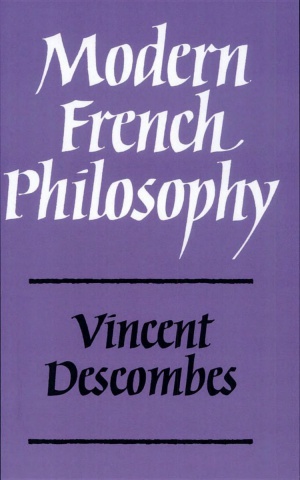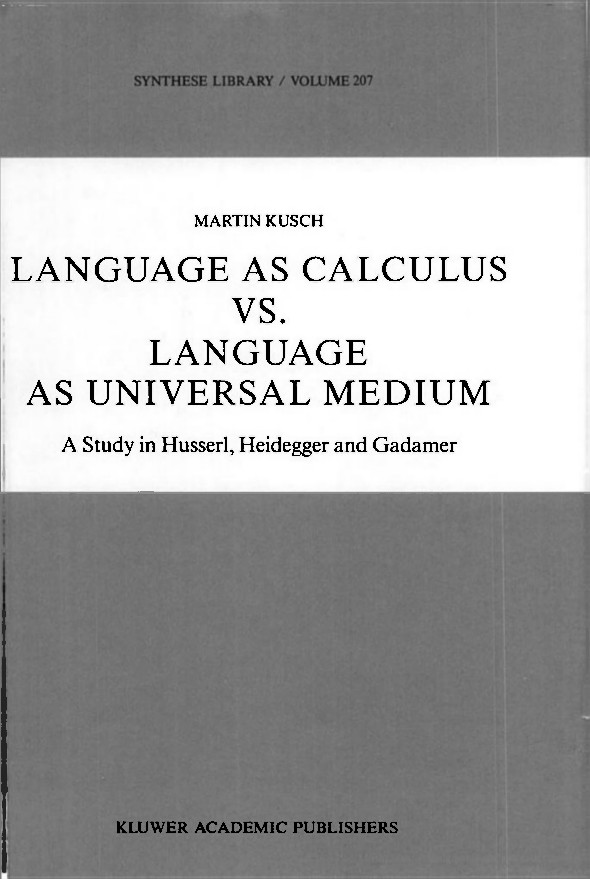Vincent Descombes: Modern French Philosophy (1979–) [EN, ES, GR, CZ, RU]
Filed under book | Tags: · dialectic, history of philosophy, phenomenology, philosophy, structuralism

“This is a critical introduction to modern French philosophy, commissioned from one of the liveliest contemporary practitioners and intended for an English-speaking readership. The dominant ‘Anglo-Saxon’ reaction to philosophical development in France has for some decades been one of suspicion, occasionally tempered by curiosity but more often hardening into dismissive rejection. But there are signs now of a more sympathetic interest and an increasing readiness to admit and explore shared concerns, even if these are still expressed in a very different idiom and intellectual context.
Vincent Descombes offers here a personal guide to the main movements and figures of the last forty-five years. He traces over this period the evolution of thought from a generation preoccupied with the ‘three H’s’ – Hegel, Husserl and Heidegger, to a generation influenced since about 1960 by the ‘three masters of suspicion’ – Marx, Nietzsche and Freud. In this framework he deals in turn with the thought of Sartre, Merleau-Ponty, the early structuralists, Foucault, Althusser, Serres, Derrida, and finally Deleuze and Lyotard. The ‘internal’ intellectual history of the period is related to its institutional setting and the wider cultural and political context which has given French philosophy so much of its distinctive character.” (from the back cover, 1980)
First published in French as Le Même et L’Autre, Les Éditions de Minuit, Paris, 1979
English edition
Translated by L. Scott-Fox and J. M. Harding
With a Foreword by Alan Montefiore
Publisher Cambridge University Press, 1980
ISBN 0521296722
192 pages
Review (Robert Young, MLN, 1982)
Review (Alasdair MacIntyre, London Review of Books, 1981)
Interview with the author (Praxis, 2012/2013)
Publisher (EN)
Modern French Philosophy (English, trans. L. Scott-Fox and J. M. Harding, 1980, no OCR)
Lo mismo y lo otro: cuarenta y cinco años de filosofía francesca (1933-1978) (Spanish, trans. Elena Benarroch, 2nd ed., 1982/1988, pp 12-15 missing, no OCR)
Το Ίδιο και το Άλλο: 45 χρόνια γαλλικής φιλοσοφίας 1933-1978 (Greek, trans. Λένα Κασίμη, 1984)
Stejné a jiné: Čtyřicetpět let francouzské filosofie (1933-1978) (Czech, trans. Miroslav Petříček jr, 1995, no OCR)
Sovremennaya frantsuzskaya filosofiya (Russian, trans. M.M. Fedorov, 2000, DJVU)
Timothy Morton: Realist Magic: Objects, Ontology, Causality (2013)
Filed under book | Tags: · causality, magic, music, object, object-oriented ontology, ontology, phenomenology, philosophy, physics, sound

“In this book Timothy Morton, an ecologist, literary theorist, and object-oriented philosopher, lures us into a magical night of objects. If things are intrinsically withdrawn, irreducible to their perception or relations or uses, they can only affect each other in a strange region of traces and footprints: the aesthetic dimension. Every object sparkles with absence. Sensual things are elegies to the disappearance of objects. Doesn’t this tell us something about the aesthetic dimension, why philosophers have often found it to be a realm of evil?
Object-oriented ontology (OOO) offers a startlingly fresh way to think about causality that takes into account developments in physics since 1900. Causality, argues OOO, is aesthetic. Morton explores what it means to say that a thing has come into being, that it is persisting, and that it has ended. Drawing from examples in physics, biology, ecology, art, literature and music, he demonstrates the counterintuitive yet elegant explanatory power of OOO for thinking causality.”
Publisher Open Humanities Press, 2013
New Metaphysics series
Creative Commons BY-SA 3.0 License
ISBN 9781607852025
228 pages
Review: Nathan Brown (Parrhesia, 2013).
Comment (0)Martin Kusch: Language as Calculus vs. Language as Universal Medium: A Study in Husserl, Heidegger and Gadamer (1989)
Filed under book | Tags: · hermeneutics, language, mathematics, phenomenology, philosophy

The book applies a novel interpretational framework in philosophy of language to the study of Husserl, Heidegger and Gadamer, emphasizing the fundamental opposition in Husserl’s and Heidegger’s views concerning the relations between language and the world. The author shows how Husserl’s idea of language as a reinterpretable sign-system informs his whole philosophical project from the early work on the philosophy of mathematics to the late studies on the life-world.
The book also explains Heidegger’s central reasons for rejecting Husserl’s conception of language, the central tenets of Heidegger’s early as well as his late “thought” being interpreted as so many corollaries of this rejection. The book concludes with a discussion of Gadamer’s hermeneutics which is analyzed as an attempt to avoid the extremities of both Husserl and Heidegger. The study also elaborates on similarities and differences between these thinkers and classicists in the analytical tradition such as Frege and Wittgenstein.
Publisher Kluwer Academic Publishers, Dordrecht / Boston / London, 1989
Synthese Library, Volume 207
ISBN 0792303334, 9780792303336
362 pages

